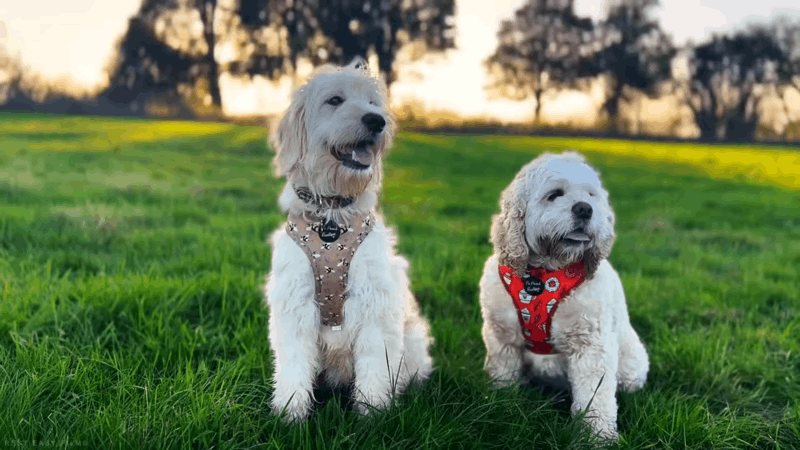No products in the cart.
Pet owners seeking to ease their furry friends’ anxiety and stress have increasingly turned to CBD for dogs with PTSD as a popular solution. PTSD in dogs, often triggered by traumatic experiences, can severely impact their emotional well-being and daily life.
The ways CBD for dogs with PTSD can provide the relief your pet needs, promoting a calmer, happier, and healthier life will be explored in this blog. The advantages of this natural remedy and the main difference it can make in your dog’s health will also be discovered.
What is PTSD in Dogs?

Post-Traumatic Stress Disorder (PTSD) in dogs is a psychological condition that occurs after a dog experiences a traumatic event. Dogs that have experienced abuse, mishaps, natural catastrophes, or extended periods of stress may acquire PTSD, much like people. To ensure dogs’s health and quality of life, recognizing and addressing PTSD is crucial.
Post Traumatic Stress Disorder in Dogs Symptoms
Identifying the symptoms of PTSD in dogs is essential for providing the right care. Here are some key signs that we should be aware of:
- Excessive fear or anxiety: By reminders of past trauma, dogs may exhibit increased fear or anxiety.
- Aggression or defensive behavior: They might show aggression or defensive reactions towards other animals, people, or objects.
- Avoidance or withdrawal: Dogs may avoid specific places or people and show reluctance to interact.
- Trembling or shaking: Physical signs like trembling or shaking, especially during stressful situations, are common.
- Increased barking: Excessive barking or vocalization can indicate distress.
- Changes in eating or sleeping: Noticeable changes in appetite or sleep patterns can signal PTSD.
- Hypervigilance: An overly alert or reactive demeanor to minor disturbances is a key sign.
Finding appropriate treatment and support for your furry friends will be easier by recognizing these symptoms early. If you notice any of these signs in your dog, consulting a veterinarian or a pet behavior specialist can provide guidance on the next steps for managing PTSD effectively.
What Causes PTSD in Dogs?
To prevent and treat PTSD in dogs effectively, understanding the cause is so important. Common causes include:
- Traumatic events: Experiences like abuse, neglect, or severe accidents can lead to PTSD.
- Abandonment: Dogs that have been abandoned or surrendered may develop PTSD due to feelings of loss and instability.
- Exposure to violence: Witnessing or experiencing violence, whether between other animals or people, can be a trigger.
- Natural disasters: Events such as floods, earthquakes, or severe storms can create lasting trauma.
- Lack of socialization: Inadequate socialization during critical developmental periods can contribute to PTSD symptoms later in life.
Understanding the main cause of PTSD, a successful treatment plan can be developed. If your dog shows signs of PTSD, seeking professional help is advised to get recovery.
Is PTSD Neurological or Psychological?

PTSD in dogs is primarily a psychological disorder, although it has neurological aspects. The dog’s psychological response to trauma can affect behavior and brain chemistry, it is also the factor causing this condition. Due to the interplay of the mind and brain, PTSD affects the dog’s physical and mental health, making a thorough treatment plan that takes into account both neurological and psychological components necessary.
How Long Does Dog PTSD Last?
The duration of post-traumatic stress disorder (PTSD) in dogs is determined by the severity of the event and the effectiveness of treatment. Some dogs may feel better after a few weeks with the correct care and encouragement, but for others, it may take months or even years to recover from their symptoms. For your dog to heal, a secure environment and consistent, kind care are essential.
To modify the treatment plan and assist your dog’s healing process, speak with a veterinarian or a canine behavior specialist if symptoms continue.
What is the Best Dog Breed for PTSD?
While no specific breed is universally best for managing PTSD in dogs, certain breeds are known for their calming and supportive nature, which can be beneficial for dogs with PTSD. Breeds that are popular for their gentle nature and capacity to help people emotionally include German Shepherds, Labrador Retrievers, and Golden Retrievers.
However, the best breed for a dog with PTSD depends on individual temperament, the nature of the trauma, and the specific needs of the dog. However, a dog’s temperament, the type of trauma they experienced, and their unique needs will all determine the appropriate breed for a dog with PTSD.
How is PTSD in Dogs Diagnosed?

To ensure accurate identification and appropriate treatment for PTSD in dogs, a careful and thorough evaluation should be considered. Here are the key steps in the diagnostic process:
- Detailed history: Collecting a comprehensive history of the dog’s experiences and observed behaviors.
- Behavioral observations: Direct observation of the dog’s reactions to various stimuli.
- Behavioral assessments: Conducting behavioral tests to identify specific triggers and responses.
- Ruling out other conditions: Ensuring symptoms are not caused by other medical or psychological conditions.
- Professional evaluation: Consultation with a veterinarian or a professional dog behaviorist to confirm the diagnosis.
Dogs can receive the care and support they need to recover and lead a happy and healthy life through a meticulous approach to diagnosing PTSD.
PTSD in Dogs Treatment
Treating PTSD in dogs requires a comprehensive approach:
- Behavioral therapy: Professional training and therapy to desensitize the dog to triggers and reduce fear responses.
- Medications: To help manage severe symptoms, anti-anxiety medications or antidepressants may be used in some cases.
- Routine and structure: Providing a consistent routine and a safe environment to help the dog feel secure.
- Positive reinforcement: Using positive reinforcement techniques to build trust and confidence in the dog.
CBD For Dogs with PTSD
CBD (Cannabidiol) is gaining popularity as a potential treatment for PTSD in dogs due to its calming and anxiety-reducing properties. Here’s how CBD can help:
- Anxiety reduction: CBD can help reduce anxiety levels, making dogs feel more relaxed and less stressed.
- Improved sleep: It can promote better sleep patterns, playing an important role in recovery.
- Mood stabilization: CBD may help stabilize mood swings and reduce aggressive or fearful behavior.
- Natural and safe: When taken as directed, CBD is a safe, natural solution with few adverse effects.
When considering CBD for your dog, it’s essential to:
- Consult a veterinarian: Always check with a vet to ensure CBD is appropriate for your dog.
- Use high-quality products: Opt for high-quality, pet-specific CBD products to ensure safety and effectiveness.
- Monitor dosage and effects: Start with a low dose and monitor your dog’s response, adjusting as needed.
With a comprehensive treatment plan for dogs with PTSD, CBD is considered as a beneficial treatment, it also can help them lead calmer and happier lives.
What is the Best Diet for PTSD?
A dog’s overall health can be supported and PTSD symptoms can be treated effectively by a balanced diet. Key dietary considerations include:
- High-quality protein: Supports brain function and overall health.
- Omega-3 fatty acids: Found in fish oil, these can help reduce inflammation and support cognitive function.
- Antioxidants: Fresh fruits and vegetables can provide essential vitamins and minerals that promote brain health.
- Avoiding additives: Minimizing artificial preservatives and additives that could exacerbate anxiety.
To customize your dog’s diet to meet their unique needs and make sure that any dietary adjustments are both safe and advantageous, speak with your veterinarian.
Conclusion
CBD for dogs with PTSD is an essential treatment for their recovery and well-being. To help your furry friend overcome their trauma and lead a happy, healthy life, recognizing the symptoms, seeking professional help, and providing consistent care and treatment should be applied. Consult with a veterinarian or a dog behaviorist to develop a tailored treatment plan when your dog has any symptoms of PTSD is essential.
Hello, I am Hazel Bennett, an experienced copywriter specializing in the fascinating topic of CBD for dogs. With a passion for pet wellness and extensive knowledge of CBD’s potential benefits, I am here to provide you with informative and engaging content.



